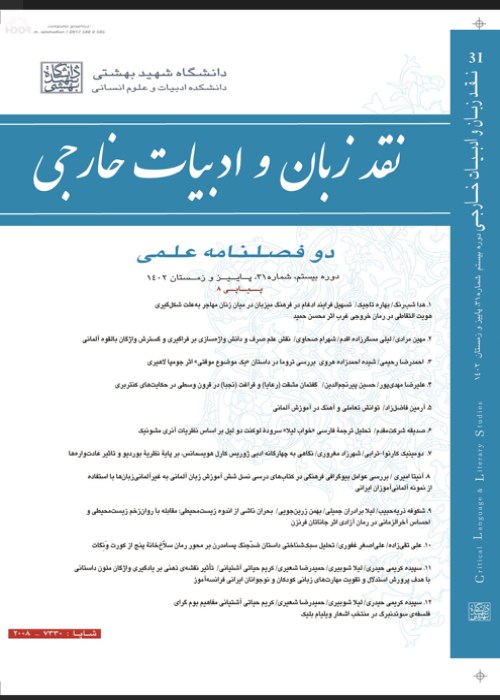The Veiled Bestsellers: The Re-emergence of Harem Literature in the post-Terror Era
Author(s):
Article Type:
Research/Original Article (دارای رتبه معتبر)
Abstract:
Introduction
September 11th (9/11) has proved to be among the most crucial events which have altered not only the political direction taken in the West but also the cultural and ethical discourses which have come alive after long efforts in the postcolonial West. Besides the triggering of "the war against terror," 9/11 broke out major controversies over concepts such as "identity," "American superiority," and "American exceptionalism" to such extent that some critics, including Žižek, described it as a cultural and psychological act of terror against American society. However, the most considerable after-effect could be the unleashing of a new wave of Islamophobia in the West and, thus, an unprecedented rise in the books, films, and works which were concerned with Islam and Islamic fundamentalism, which was not far from the expectation at the time when the West was propagandizing its "war against terror."
Background Studies
Gillian Whitlock’s Soft Weapons: Autobiography in Transit and her seminal article, "The Skin of the Burqa: Recent Life Narratives from Afghanistan" are considered like two major sources used in this research to discuss the emergence of Veiled Best-seller, as the new kind of Harem Literature. Furthermore, Judith Butler’s Precarious Life: The Powers of Mourning and Violence and Catherine Burwell’s "A Too-Quick Enthusiasm for the Other: North American Women’s Book Clubs and the Politics of Reading" have been two other sources deployed to discuss how "gender" has been abused by Oriental feminists to further neoliberal humanism in recent decades. To explore such conception further, this research has considered Emmanuel Levinas’s conception of "the other," as it has been discussed in Ethics and Infinity and Totality and Infinity.
Methodology and Argument
Jean Sasson’s Mayada: The Daughter of Iraq (2003), subtitled as One Woman Survival under Sadam Hussein, was among those works grabbing attention of a considerable number of readers. As a Veiled Best-seller, a kind of Harem Literature, Mayada proved to be in line with the emergence of the neo-liberal imperialism. Following a clichéd pattern, Sasson, thus, like the Orientalist writers of early 19th century adopts the perspective of a western traveler trusted by Mayada to listen to her and to save her and her sisters from the "suppression" of Islamic Shariah. This article, through a post-colonial feministic approach and the deployment of ideas by Gillian Whitlock, Judith Butler, and Emanuel Levinas attempts to focus on the re-emergence of "Harem literature" through the new genre of Veiled Best-sellers which has been popularized since the September-eleventh terrorist attack. It is discussed how such works have been abused to endorse neo-liberal policies and to justify the West’s attack on Afghanistan and Iraq. It, also, reveals how such works have been in line with the western policies of "war against terror" and the new phase of civilizing missions on the part of the West. In fact, it exposes how the West has abused the current social and philosophical movements, including Feminism and postmodern concept of ethics, especially the Levinasian theory of "the other," to justify its acts.
Conclusion
The study concludes that, despite the West’s attempt to attribute the popularity of such post- ninth-eleventh works to the "white man’s burden" towards his "oriental sister" at that time, such an "other-oriented" ethical discourse brings about no end to the liberal conception of subjectivity (as defined by modernist binary oppositions of the self/other). On the other hand, it once more pushes the liberal humanism’s discourse of western racial supremacy and consequently justifies the neo-colonial wave in the West. In other words, the West’s attempt to impose its own standards of civilization on its oriental counterparts has just led to the disappearance of "the other" and the re-emergence of the so-called colonial regime of homogeneity and control, which has put the notion of civilization into question and resulted in the formation of military regimes here and there.Keywords:
Language:
Persian
Published:
Critical Language & Literary Studies, Volume:16 Issue: 22, 2019
Pages:
143 to 164
magiran.com/p2008803
دانلود و مطالعه متن این مقاله با یکی از روشهای زیر امکان پذیر است:
اشتراک شخصی
با عضویت و پرداخت آنلاین حق اشتراک یکساله به مبلغ 1,390,000ريال میتوانید 70 عنوان مطلب دانلود کنید!
اشتراک سازمانی
به کتابخانه دانشگاه یا محل کار خود پیشنهاد کنید تا اشتراک سازمانی این پایگاه را برای دسترسی نامحدود همه کاربران به متن مطالب تهیه نمایند!
توجه!
- حق عضویت دریافتی صرف حمایت از نشریات عضو و نگهداری، تکمیل و توسعه مگیران میشود.
- پرداخت حق اشتراک و دانلود مقالات اجازه بازنشر آن در سایر رسانههای چاپی و دیجیتال را به کاربر نمیدهد.
In order to view content subscription is required
Personal subscription
Subscribe magiran.com for 70 € euros via PayPal and download 70 articles during a year.
Organization subscription
Please contact us to subscribe your university or library for unlimited access!


